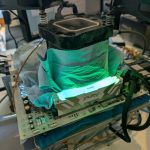
The legendary Hubble telescope snapped an image of an intriguing galaxy, some 130 million light-years away.
NGC 5728 is a spiral galaxy, similar to the Milky Way, but with an especially energetic core, as seen in the recent Hubble image. This is a class of galaxy with an “active galactic nucleus (AGN),” explained NASA.
Hubble’s invaluable Wide Field Camera 3 — installed by astronauts in 2009 during their last and final trip to service Hubble — captured this intense visible and infrared light (infrared is light we can’t see but can sometimes feel as heat).
Yet, importantly, NASA emphasizes that NGC 5728’s energetic core (filled with stars) is actually emitting much more light than Hubble (or us) can see. In other words, significantly more light, coming out in other wavelengths, is emanating from the galaxy.
“This galaxy is more than meets the eye…” NASA tweeted from its Hubble Twitter account.

Credit: ESA / Hubble / A. Riess et al. / J. Greene
NASA’s next generation of space telescope, the James Webb Space Telescope, is currently set to launch on Dec. 18. The telescope, with larger mirrors and a much greater resolution than Hubble, will peer at some of the oldest galaxies in our universe, and observe planets forming in distant solar systems.
Powered by WPeMatico






